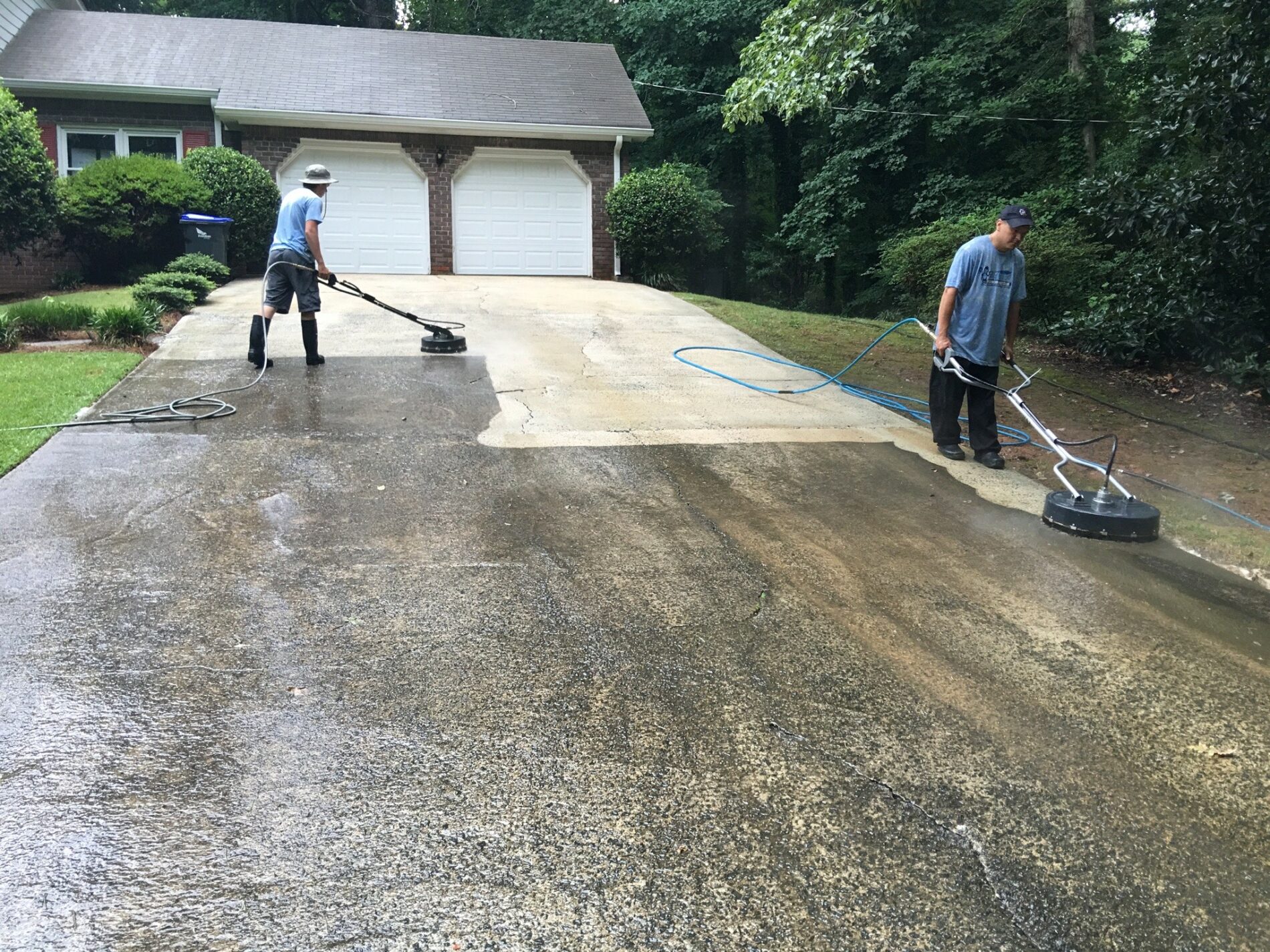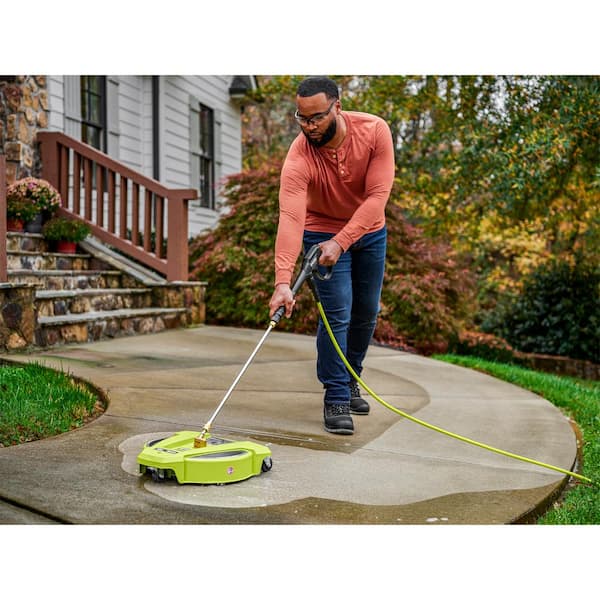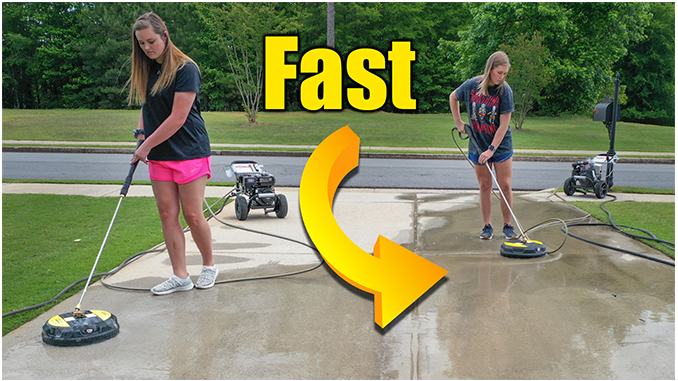For cleaning a driveway, a pressure washer with a PSI between 3000 and 4000 is ideal. This range effectively removes dirt, grime, and stains.
Choosing the right PSI for your driveway is crucial for effective cleaning. A pressure washer with 3000 to 4000 PSI provides the power needed to tackle tough stains and embedded dirt. Driveways often accumulate oil spots, mold, and grime that standard cleaning methods can’t handle.
Using a higher PSI ensures a thorough clean without damaging the concrete surface. Selecting the right nozzle also plays a significant role in achieving the best results. A wide spray pattern can cover large areas quickly, while a narrow stream targets tough stains. The combination of adequate PSI and proper technique ensures your driveway looks brand new.
Page Contents
- 1 Introduction To Pressure Washing Driveways
- 2 Understanding Psi And Pressure Washers
- 3 Assessing Your Driveway’s Needs
- 4 Recommended Psi For Common Driveway Materials
- 5 The Impact Of Water Flow On Cleaning Efficiency
- 6 Additional Tools For Enhanced Cleaning
- 7 Safety Considerations When Using A Pressure Washer
- 8 Maintenance And Upkeep Of Your Pressure Washer
- 9 Conclusion: Making The Best Choice For Your Driveway
- 10 Frequently Asked Questions
- 11 Conclusion
Introduction To Pressure Washing Driveways
Pressure washing driveways is important for maintaining curb appeal. Choosing the right PSI is essential to avoid damage. A pressure washer with too high PSI can harm surfaces. Generally, a range of 3000 to 4000 PSI works well for concrete driveways.
Factors influencing pressure washer selection include surface type, dirt level, and surrounding area. Concrete needs more power than asphalt. For light stains, lower PSI is sufficient. Heavy stains or mold require higher PSI for effective cleaning.
| Surface Type | Recommended PSI |
|---|---|
| Concrete | 3000 – 4000 PSI |
| Asphalt | 2000 – 3000 PSI |
| Wood | 1500 – 2000 PSI |

Credit: www.pinkprowash.com
Understanding Psi And Pressure Washers
PSI stands for pounds per square inch. It measures water pressure. Higher PSI means more cleaning power. This is important for tough stains.
Different pressure washers have different PSI ratings. Here are some common types:
| Type of Pressure Washer | PSI Range |
|---|---|
| Electric | 1,300 – 2,000 PSI |
| Gas | 2,000 – 4,000 PSI |
| Commercial | 3,000 – 5,000 PSI |
Choose the right PSI for your driveway. Light stains need lower PSI. For heavy stains, use higher PSI.
Assessing Your Driveway’s Needs
Choosing the right psi pressure washer for your driveway depends on the material. Common driveway materials include concrete, asphalt, and pavers. Each material has different cleaning needs.
For concrete driveways, a pressure washer with 3000-4000 psi is ideal. This helps remove tough stains like oil and grime. Asphalt requires a lower psi, around 2000-3000 psi, to avoid damage.
Pavers need careful cleaning. A pressure washer with 2000-2500 psi will keep them safe. Stain types also matter. Oil stains need higher pressure, while dirt can be removed easily.
| Material | Recommended PSI |
|---|---|
| Concrete | 3000-4000 |
| Asphalt | 2000-3000 |
| Pavers | 2000-2500 |

Credit: www.homedepot.com
Recommended Psi For Common Driveway Materials
Choosing the right PSI for your driveway is important. For concrete driveways, aim for a PSI between 3000 and 4000. This range effectively removes dirt and stains.
For asphalt driveways, a lower PSI of 1500 to 3000 is ideal. This prevents damage while cleaning. Paver driveways need around 2500 to 3000 PSI for safe cleaning.
| Driveway Material | Recommended PSI |
|---|---|
| Concrete | 3000 – 4000 |
| Asphalt | 1500 – 3000 |
| Pavers | 2500 – 3000 |
The Impact Of Water Flow On Cleaning Efficiency
The cleaning efficiency of a pressure washer depends on two key factors: PSI and GPM. PSI stands for pounds per square inch. It measures the pressure of the water coming out. Higher PSI means stronger cleaning power. GPM stands for gallons per minute. It measures how much water flows through the nozzle.
Both PSI and GPM work together for effective cleaning. A high PSI can remove tough stains, but low GPM may leave dirt behind. Likewise, a high GPM with low PSI may not clean effectively. Finding the right balance is essential.
| PSI | GPM | Cleaning Power |
|---|---|---|
| High | Low | Strong but less water |
| Low | High | Gentle but more water |
| Balanced | Balanced | Effective cleaning |
Additional Tools For Enhanced Cleaning
Using a surface cleaner can make driveway cleaning faster and easier. These tools cover a larger area, reducing cleaning time. They also help to avoid streaks, ensuring a smooth finish. Surface cleaners are great for removing tough stains like oil or dirt.
Choosing the right nozzle is crucial for effective cleaning. Different nozzles produce varying spray patterns. A 0-degree nozzle provides a concentrated stream for tough spots. A 25-degree nozzle is better for larger areas, offering a wider spray. Always select the nozzle based on the type of surface and the level of dirt.
Safety Considerations When Using A Pressure Washer
Using a pressure washer requires careful attention to safety. Always wear safety goggles to protect your eyes. Use gloves to keep your hands safe from chemicals and debris. Non-slip shoes prevent falls on wet surfaces.
Keep children and pets away from the work area. This helps avoid accidents and injuries. Inspect the pressure washer before use. Look for leaks or damaged parts. Always follow the manufacturer’s instructions for safe operation.
Start with a low psi setting and test a small area first. This prevents damage to the driveway. Maintain a safe distance from the surface to avoid gouging or etching. Finally, never point the nozzle at people or animals.
Maintenance And Upkeep Of Your Pressure Washer
Regular maintenance is key for your pressure washer’s longevity. Check the oil levels and change it regularly. Clean or replace the filters to ensure optimal performance. Inspect the hoses for any signs of wear or leaks.
Keep the nozzle clean and free from any blockages. This helps maintain a strong water flow. Store the pressure washer in a dry place to prevent rust. Following these steps will keep it running smoothly.
Troubleshooting common issues can save time and money. If the washer won’t start, check the power source. Ensure the water supply is adequate. Clogs may cause low pressure; unclog the nozzle to fix this.
For persistent problems, consult the manual or contact a professional. Regular checks can prevent many issues.
Conclusion: Making The Best Choice For Your Driveway
Choosing the right PSI pressure washer for your driveway is important. A 3000 PSI washer is ideal for tough stains. For regular cleaning, a 2000-2500 PSI model works well. Consider the surface material of your driveway. Concrete surfaces need higher pressure, while asphalt requires less. Check for cleaning solutions that match your pressure washer. Always follow the manufacturer’s guidelines for safe use. Think about the nozzle size too; it affects the pressure and spray pattern. A 15-degree nozzle is great for tough stains, while a 25-degree nozzle works for lighter cleaning. Overall, a well-chosen pressure washer will keep your driveway looking its best.

Credit: www.howtowithdoc.com
Frequently Asked Questions
What Is The Ideal Psi For Driveway Cleaning?
The ideal PSI for driveway cleaning typically ranges from 3000 to 4000 PSI. This pressure effectively removes dirt, grime, and oil stains. However, ensure the pressure washer has adjustable settings to prevent damage to the concrete surface.
Can I Use A Lower Psi For My Driveway?
Yes, you can use a lower PSI, around 2000 to 2500, for lighter cleaning tasks. This is suitable for regular maintenance and removing surface dirt. Always test a small area first to ensure it meets your cleaning needs without causing damage.
What Is The Best Type Of Pressure Washer For Driveways?
A gas-powered pressure washer is usually best for driveways. It delivers higher PSI and GPM, making it more effective for tough stains. Electric models are also viable for lighter tasks but may lack the power needed for heavy-duty cleaning.
How Often Should I Pressure Wash My Driveway?
You should pressure wash your driveway at least once a year. However, if you notice stains or dirt buildup, consider cleaning more frequently. Regular maintenance helps prolong the life of your driveway and keeps it looking fresh.
Conclusion
Choosing the right PSI pressure washer for your driveway is essential for effective cleaning. Consider the material and size of your driveway to determine the optimal pressure. A washer between 2,000 and 3,000 PSI typically works best. With the right tool, you can achieve a spotless, welcoming entrance to your home.
